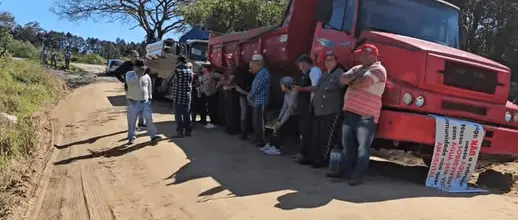
Brazil: Military Brigade Represses Peasant Struggle for Water
A Nova Democracia has recently reported on the struggle of peasants for access to water in the Águas Claras. They were harassed and repressed on September 11 by the Military Brigade after they closed a road using agricultural machinery and trucks protesting the extraction of water from the area by the former State company CORSAN-AEGEA. During the protest, the Military Brigade tried to intimidate the peasants in an aim of stopping the protest. However, the people did not back down and continued the blockade.
The peasants organized through the Águas Claras Residents’ Association, which rejects the construction works for the purpose of water extraction in the area. More than 77 million liters of water will be extracted per day after the completion of the work in the area, a quantity far greater than the approximately 3 million liters consumed by the around 20,000 peasants living there.
In a video shared on the Facebook page of the residents’ association, one of the peasants stated, “We will not budge. We do not accept this company exploiting the water from our aquifer.” The residents supported this video through comments and denounced the State’s implication.
There are denouncements all over the country against the anti-people actions done by CORSAN-AGEA. But especially in Águas Claras, A Nova Democracia already denounced the precarious sanitation in the cities that led to protests by residents for the great amount charged for water supply.
The theft of water across the country has mobilized the people, especially peasants, in the struggle for the right to access this resource. In 2024, Guarani-Kaiowá, indigenous people from Mato Grosso do Sul staged blockades on important highways in protest against the lack of water. This year, paramilitary groups associated with the Kruger big landlord family even constructed a trench as a threat to the indigenous community, interrupting the flow of water from a significant river that supplied them.
The complicity and support of the government for these practices are evident due to the wave of privatizations of water distribution companies across the country, as well as in mega-projects from the old State that directly benefit the theft of water. One such project is the redirection of the São Francisco River, which ultimately benefits big landlords, either through the control of water sources or through the illegal appropriation of the most productive land belonging to poor peasants.

